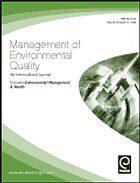|
Literature / Source Database:
Management of Environmental Quality
| Title (short) |
Managem. Environ. Qual. |
| Languages |
English |
| First year |
2003 |
|
|

|
Status
active
Indexing
Emerald Management Reviews; Barbour Index; CAB Abstracts; CAB Health; Environmental Periodicals Bibliography; Pollution Abstracts (Published by Cambridge Scientific Abstracts); CSA Mechanical & Transport Engineering Abstracts (Selective)
Predecessor
Subject

Source type
Journal
Publisher
ISBN ISSN
1477-7835
First volume
14
Last volume
20+
Publish city
Bradford, West Yorkshire
Homepage
| Resources |
|
Availability |
|
|
|
|
|
| Text PDF |
 |
free access |
 |
| Text Html |
 |
for subscriber |
 |
| References |
 |
not available |
 |
| Abstracts |
 |
|
|
| TOC |
 |
|
|
|
|
|
|

Description
Unique attributes To examine in a deep and objective manner the various environmental factors and their impact on the overall quality of ecosystems and quality of life, to suggest possible remedies to environmental problems and to adopt an inter-disciplinary approach to the problem of managing the environment and upkeeping good quality standards, with a view to reducing the deleterious effects of man's activities. Topicality The advancement of the industrialized world, with its technological and chemical emphasis, and the intensive farming practices needed to support a voracious population have created massive prosperity. The price we pay for these riches is the deterioration in our health and the emergence of disabling and killer diseases, many of which are of our own making. Key benefits By analyzing ways in which industrial and agricultural bodies can take preventative and remedial action to reduce pollution and the use of chemicals and eliminate the problem of hazardous waste products-in other words, managing our environment responsibly - the journal presents major research findings, warnings of potential dangers to health, and suggestions for different codes of practice to safeguard our environment and health. It also encourages international liaison, assessment, and co-operation. Key journal audiences - Academics and their libraries
- Central and local government personnel with responsibility for environmental decision-making
- Health care managers and specialists dealing with problems created by the deteriorating environment
- Senior industrial personnel with decision making powers
The broad coverage of the journal includes key issues such as: - Environmental protection
- Nutrition, drugs and genetic engineering
- Pollution control
- Radioactive waste
- Stress and disease
- Toxic products
- Waste disposal
- Water resources
|